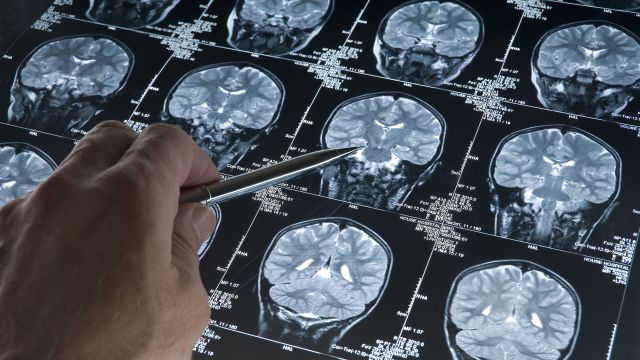When a football player makes an awesome tackle that flattens the opponent, the crowd usually goes wild. What most fans don't see in all the excitement is the ugly side of sports—brain injury.
Sports-related concussions have risen nearly 60 percent in the past decade. Some blame it on our competitive culture. Others say it's a matter of more awareness and reporting.
Either way, having your bell rung often means a trip to the emergency room for a CT or MRI scan of your brain. Surprisingly, those tests often come back normal in many mild injuries. If your test results look normal, the doctor might advise you to rest up—and hope you understand that this is still serious business.
But what if there was a third, possibly better test to confirm mild brain trauma? One that could help you or your kid better picture what's happened to your priceless brain and convince you to stick to the doctor's orders? Something that could also make a difference in the treatment your doc recommends?
Turns out, some brain experts aren't satisfied with using just CT and MRI. They're working on the future of brain imaging—by looking at its past.
A review paper published March 19, 2014 in PLOS One showed that an older brain imaging technology may be part of the solution. It's called a SPECT scan, which stands for single-photon emission computed tomography.
"While MRI and CT anatomy scans look at the structure of the brain, SPECT looks at the blood flow and activity levels within the brain," explains psychiatrist and SPECT expert Daniel Amen, MD, one of the co-authors of the paper. Amen says to think of a car engine. "An MRI or CT scan shows what the engine looks like. SPECT shows what it's like when it's turned on."
Notes Sharecare Chief Medical Officer Keith Roach, MD, "In the case of traumatic brain injury (TBI) and a negative MRI or CT, SPECT has the ability to make the diagnosis and guide therapy."
For example, if your CT and MRI were normal, but your SPECT scan was abnormal right after your injury and again several months later, your doctor might recommend more aggressive treatments. Without those SPECT scans to look for functional abnormalities not seen by a CT or MRI, you could be told your brain is fine—even if it's not.
"At Amen Clinics, we've been using SPECT for the past 23 years to help target and optimize treatment," Dr. Amen adds. "We found that undiagnosed TBI is a major cause of anxiety, depression, ADHD, school failure, relationship problems, homelessness and substance abuse. But if psychiatrists never look at the brain, how would they ever know if it was an injury or a psychological problem?"
Brain injuries don't just affect people who play sports, either. Many older adults are at high risk of concussions from falls. Some symptoms—like memory problems, irritability and trouble sleeping—could be written off as signs of aging, when the person may have a brain injury.
SPECT may help provide answers when CTs and MRIs don't. What's more, it might give you and your family the visual you need to understand your injury, feel justified in your symptoms and follow through with treatment—taking a more aggressive approach when it makes sense. Keep in mind, the American College of Radiology guidelines call for SPECT only in certain cases, and health insurance companies may not cover it. For now, your doctor is your best source to find out if SPECT may be right for you.






